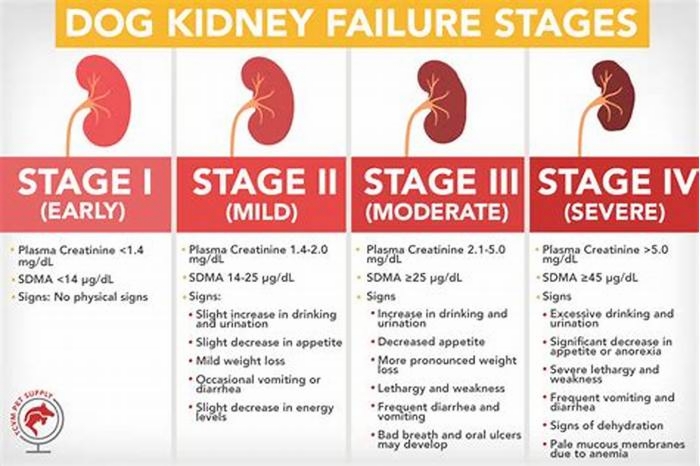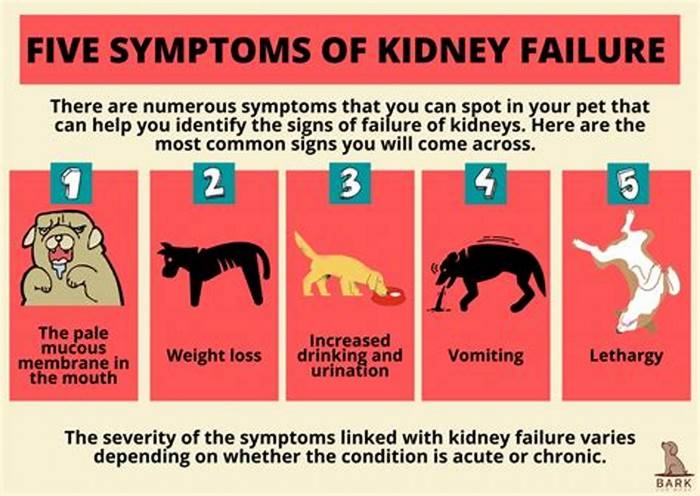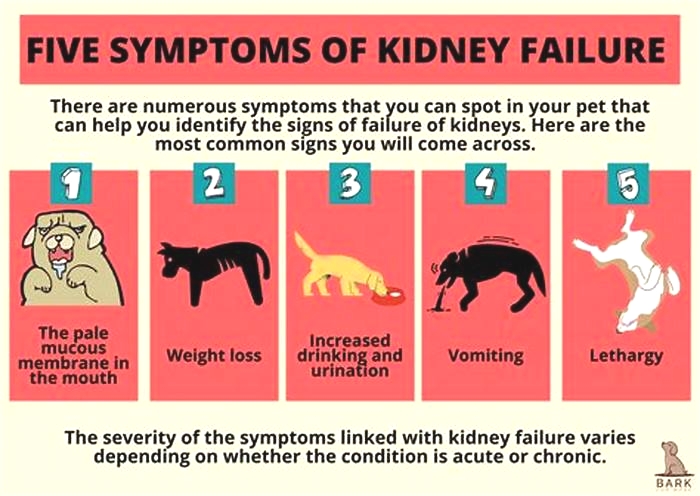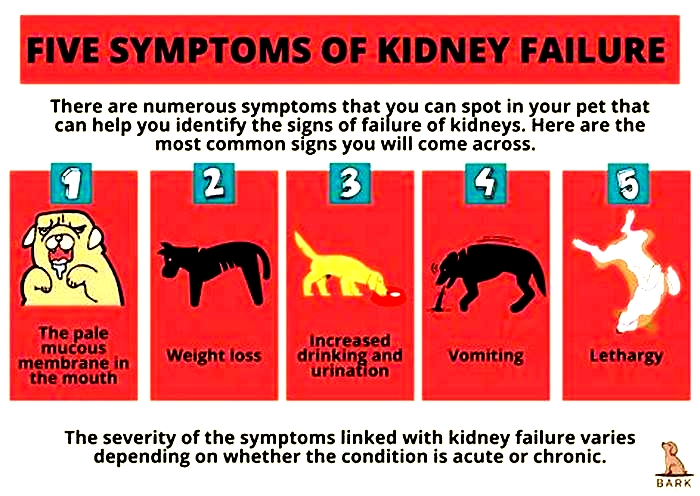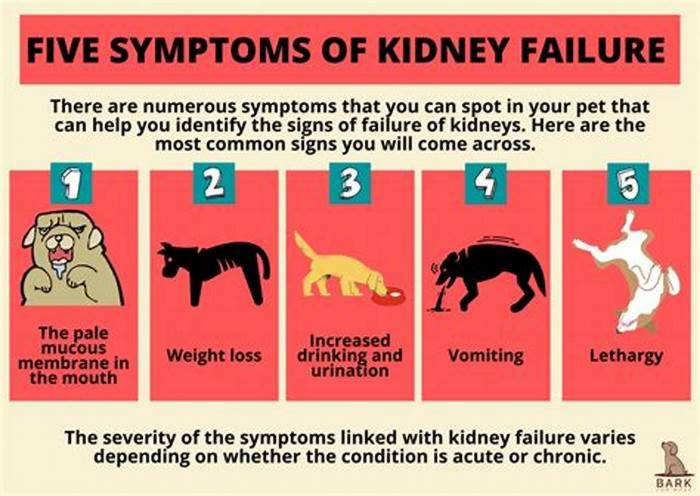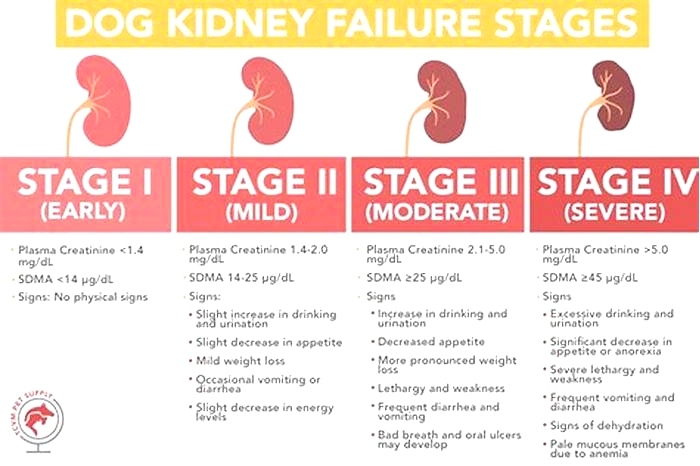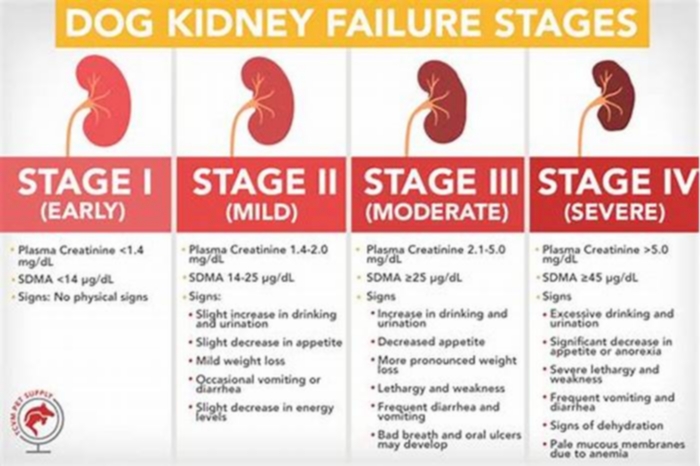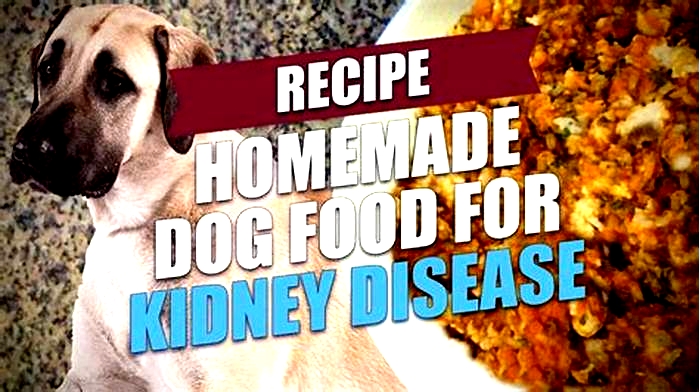kidney failure in dogs early signs
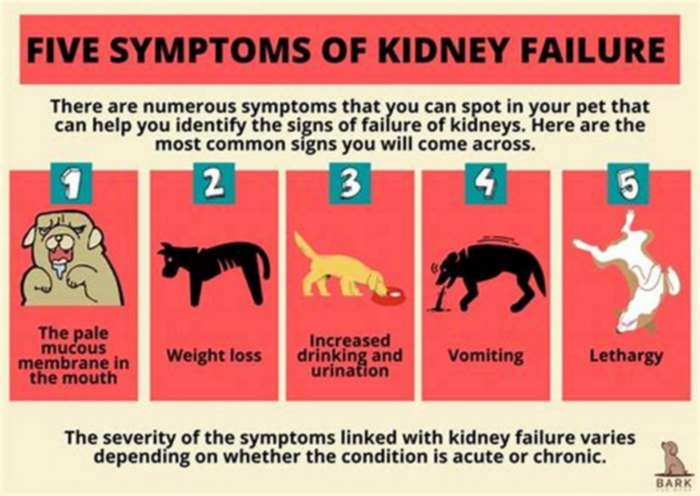
Kidney Failure in Dogs
Types of Kidney Failure in Dogs
There are two types of kidney failure in dogs - acute kidney failure and chronic kidney failure.
Acute kidney failure occurs when there is a sudden decline in kidney function (within hours or days) as a result of toxin exposure (such as antifreeze, raisins, grapes, and some human medications) and bacterial infection.
On the other hand, chronic kidney failure involves a gradual but progressive loss of kidney function. The problem can take weeks, months, or years to develop. Age-related issues are the topmost reasons for kidney failure in dogs. Deterioration of organ structure and function inevitably occur from years of wear and tear.
The size of the dog has been found to influence the age of onset of chronic kidney disease. Early signs of kidney disease in smaller dog breeds may be exhibited when theyre about 10-14 years of age. On the other hand, larger breeds, which are known to have shorter life spans than their smaller counterparts, may develop kidney failure as early as seven years old.
Acute Kidney Failure in Dogs
Signs of Acute Kidney Failure
Dogs with acute kidney failure typically show signs of severe lethargy, vomiting, and reduced appetite. They may be drinking and urinating a lot or not at all.
Causes of Acute Kidney Failure
- One of the most common causes of acute kidney failure in dogs is ingestion of toxins, such as antifreeze, rodenticides, or some human medications (such as ibuprofen). Dogs are such curious creatures and this trait can increase their risks for toxin exposures.
- Infection with a bacterial organism called Leptospirosis can lead to kidney failure in pets and people.
- Various drugs can also cause kidney failure in certain pets.
- Severe infections or illnesses like sepsis or pancreatitis can also lead to acute kidney failure.
- Obstruction of the urinary tract caused by kidney stones or bladder stones that restricts urine flow.
- Anything that decreases the flow of blood through the kidneys, including dehydration, heatstroke, bee stings, or snake bites.
Treatment of Acute Kidney Failure
Acute kidney failure is a serious condition. Aggressive and quick treatment to support the kidneys and manage the underlying cause can be lifesaving. Treatment typically consists of hospitalizing your dog and keeping them on IV fluids, administering anti-nausea medications, administering antibiotics if needed, and ensuring they receive proper nutrition. The treatment may take days to weeks. Rechecking blood work and urine tests will help your vet monitor your dogs response to treatment.
Acute kidney failure can be fatal in over half the cases, even with treatment. Approximately 20% will recover and have chronic kidney disease as a result of the damage and 20% will recover and regain normal kidney function.
Chronic Kidney Failure in Dogs
Older cats are more prone to developing chronic kidney failure compared to dogs, but dogs can also develop this condition. Since this is a slow, progressive process, your dog may not show symptoms immediately. You may notice weight loss or muscle mass loss even though your dog is eating well. You might also notice your dog drinking and urinating more than usual. Its important to note that diabetes can cause similar symptoms.
Diagnosing Chronic Kidney Failure
Early stages of chronic kidney disease can be diagnosed with routine yearly blood work and urine tests before clinical symptoms even develop. If your vet suspects kidney failure, they will recommend basic blood work, urinalysis (urine test), and blood pressure measurements to help diagnose kidney failure, stage the kidney failure, and discuss proper treatments and supportive care.
Kidney failure is staged in 4 levels, with Stage 1 being the mildest and Stage 4 being the most severe.
Treatment for Chronic Kidney Failure
Once your vet has diagnosed and staged your dogs kidney failure, treatment will be discussed. Options can range from medications that lower blood pressure, treatment to reduce protein loss in the urine, intravenous or subcutaneous fluids, potassium replacement, medications to help improve red blood cell levels, and dietary changes.
There are a variety of prescription kidney supportive diets available. These diets can help your dog feel better and live longer, often for years, depending on the stage of kidney failure your dog is experiencing. Since some dogs can be picky eaters, you may need to try a variety of diets to find one they enjoy, so dont be discouraged if they refuse a few types!
Encouraging your dog to drink more water will also help support the kidneys. Canned foods contain more fluids compared to dry kibble, so feeding your dog canned food and eliminating the kibble may be recommended. Adding water or low sodium chicken broth (avoid onions and garlic) to the food can also encourage more water intake. Having multiple water bowls around the house will make it easier for your senior dog to take a drink when they want to.
Home Care for Dogs with Kidney Failure
If your dog has been diagnosed with chronic kidney disease, here are some ways to help your dog have a better and longer life:
- Prescribed medications should be administered exactly as instructed by your veterinarian.
- Keep a close eye on your dogs diet and food intake. If your pet is on a prescription diet, avoid feeding extra treats or snacks.
- Divide your dogs daily ration into several smaller meals given at regular intervals throughout the day.
- Fresh food should always be offered during each mealtime.
- Fresh clean water should be available to the dog at all times.
- If your dog has a poor appetite, try warming the food to just below body temperature. Warming can enhance the taste and flavor of the food and encourage your pet to eat.
- Regular monitoring is very important. Dont skip your pets appointments with your veterinarian for follow-up exams and lab work
Read more:
Urinary Tract Infection (UTI) in Dogs
Canine Hormone-Responsive Urinary Incontinence
My dog has Cushings disease. What does this mean?
Need to speak with a veterinarian regarding your dogs kidney disease or another condition?
Click here to schedule a video consult to speak to one of our vets. You can also download the FirstVet app from the Apple App Store and Google Play Stores.
Signs, Symptoms & Causes of Kidney Failure in Dogs
What is kidney failure in dogs?
Kidney failure is also referred to as renal failure, and can be caused by a number of diseases that can impact the kidneys and related organs. Healthy kidneys are supposed to eliminate toxins, regulate hydration, maintain a normal electrolyte balance and release hormones required to produce red blood cells.
Kidney failure technically happens when the kidneys can no longer perform their function efficiently, and in dogs there are two broad categories:
Acute renal failure
When kidney function suddenly decreases (within hours or days), this is known as acute renal failure. It is usually related to toxins or infections.
Chronic renal failure
If the loss of kidney function is gradual (over weeks, months or years), its referred to as chronic renal failure. Its most commonly caused by degeneration associated with old age. All kidneys have a lifespan, but some dogs may deteriorate faster than others.
One clear difference between acute and chronic kidney failure is while acute kidney failure is likely reversible if treated early and aggressively, chronic kidney failure can only be managed.
What causes kidney failure in dogs?
Any disease that affects the kidneys can cause the kidneys to fail. These conditions can include:
Dental disease - When bacteria build up on the teeth and gums, this can lead to advanced dental disease. The bacteria can enter the blood stream and attack multiple organs, causing irreversible damage to the kidneys in addition to the heart and liver.
Toxicosis - When the kidneys are poisoned, this can lead to cell damage within the kidneys. It can happen when your dog consumes drugs or poisons (such as foods or substances that are toxic to them).
Geriatric degeneration - As your dog ages, cells can break down and die. This also happens in the kidneys and can lead to kidney disease.
Bacterial infections - If your dog swims or drinks in contaminated water, bacterial infections such as leptospirosis can attack the system, causing the kidneys to become inflamed and renal cells to die.
Congenital disease - This category can include underlying illnesses and hereditary conditions - everything from agenesis (being born without one or both kidneys) to cysts.
Symptoms of kidney failure
- Significant weight loss
- Vomiting
- Pale gums
- Drunken behavior or uncoordinated movement such as stumbling
- Breath that smells like chemicals
- Significant decrease in appetite
- Increase or decrease in water consumption
- Increase or decrease in volume of urine
- Ulcers in the mouth
- Blood in urine
- Lethargy
- Intestinal seizures
The type of kidney failure your dog is experiencing, and the extent of loss of function in the kidneys, the progression of the condition and the underlying cause can indicate whether kidney issues or another problem such as diabetes mellitus are causing the symptoms.
How is kidney failure in dogs treated?
Like many other conditions, treatment of kidney failure will be determined by your dogs condition and the underlying cause of his kidney problems. Acute kidney failure can make dogs very sick and may need to be treated in the hospital, in intensive care.
Your vet may be able to treat milder cases with fluids, antibiotics and medications on an outpatient schedule. Dialysis, although costly, can also be effective.
With chronic kidney failure, vets generally focus on slowing down the diseases progression and looking at ways to improve quality of life for the patient. Nausea, fluid imbalances, blood pressure fluctuations and other symptoms will need to be treated, usually with medication and changes to diet.
Pets can occasionally enjoy a good quality of life for years (some indications are up to four years) after being diagnosed with kidney failure. Your vet may also recommend specific nutrients, nutritional supplements or a therapeutic diet to manage the condition.
How can I prevent my dog from suffering kidney failure?
Because acute kidney failure is often caused by interactions with toxins and consuming tainted foods or foods they shouldnt ingest, such as grapes, this type is preventable in many instances.
Take inventory of your house and remove potential toxins such as antifreeze (the chemical ethylene glycol is toxic to dogs) and put medications and other foods or substances out of reach.
Sadly, chronic kidney failure is most commonly age-related and predetermined by genetics. However, keeping up with regular physical exams and annual wellness checkups will increase the chances any problems will be detected early. After that, treatment can be planned.
Note: The advice provided in this post is intended for informational purposes and does not constitute medical advice regarding pets.
Do you suspect your dog has kidney failure? Our veterinarians are experienced in diagnosing and treating a wide range of conditions in pets.Contact our Clemmons animal clinic todayfor advice.
Kidney Failure in Dogs
What Is Kidney Failure in Dogs?
The primary job of the kidneys is to filter the blood by removing waste products and controlling the amount of fluid and nutrients kept in the body and how much is passed in urine.
With any type of kidney failure, this filtering isnt working well, so waste products are not properly removed from the bloodstream and too much fluid is passed in urine along with proteins and electrolytes. As waste products build up in the blood and tissues, dogs can get ulcerations (tears) in the lining of their digestive tract as well.
Kidney failure may also be referred to by terms listed below. The word renal refers to all things related to kidneys, and is often used interchangeably. Failure, insufficiency, and disease are commonly used to describe similar issues with the kidneys.
Kidney disease is often divided into categories based on how long it has been affecting the dog. Acute renal failure occurs in a very short time frame, and is often caused by eating or drinking a toxin or getting a severe infection that harms the kidneys. Chronic kidney disease refers to a process with a more gradual onset or one that has been happening for a longer period of time.
Changes that can occur with an aging pet are often caused by chronic kidney disease, but if a dogs kidneys were damaged by eating a toxic item several months ago and he now has renal failure because of this, it is also known as chronic kidney disease.
Symptoms of Kidney Failure in Dogs
Drinking more water (polydipsia)
More frequent urination (polyuria)
Urinary accidents in house-trained pets
Lack of energy
Refusing to eat
Vomiting
Drooling
Changes in defecation (either diarrhea or constipation)
Weight loss
Mouth sores
Bad breath
Weakness
Causes of Kidney Failure in Dogs
Kidney failure can occur because of an acute event, such as a toxin ingestion or infection that harms the kidneys; degenerative (worsening) changes over time; or an underlying medical condition that damages renal tissues, which can occur due to genetic predispositions in some dog breeds.
Specific causes include:
Ingested toxins
Metabolic diseases
Kidney infections
Autoimmune disease
Cancers
Breeds that are prone to inherited renal failure include:
How Veterinarians Diagnose Kidney Failure in Dogs
Your veterinarian will want to run several tests, in addition to a physical exam, to diagnose kidney failure, such as:
Complete blood count
Chemistry panel
Urinalysis with culture
Abdominal ultrasound
Treatment of Kidney Failure in Dogs
Treatment of kidney failure is based on the severity of the disease and whether it is acute or chronic.
Acute kidney disease is treated with hospitalization and IV fluid therapy to support the kidneys and help them remove wastes. Depending on the cause of the disease, decontamination medications, toxin-binding medications, antibiotics, or medications to support the gastrointestinal tract may be given. In extreme cases, renal dialysis can help the kidneys. This last procedure is rare, only available at some university or veterinary specialty hospitals.
Chronic kidney disease requires careful management of dogs at home. They need to have access to water at all times and be encouraged to drink water. Many dogs have improvements with a prescription kidney diet. Some dogs need to be on medications to control high blood pressure or to protect their stomach. Pets with chronic kidney disease need to see their veterinarian often so that their renal values can be checked. Some dogs with kidney disease need to receive injectable fluids at home or may even need to be hospitalized at times to help their fluid needs.
Recovery and Management of Kidney Failure in Dogs
With acute kidney failure, prognosis is variable depending upon the cause of the disease, how severe the disease is, how damaged the kidneys are, the speed and aggressiveness of treatment, and the dogs response.
For chronic renal failure, long-term prognosis is not good. Most dogs die or are euthanized within a year because of poor quality of life.
The families of dogs with kidney disease should expect to watch them closely and will need to see their veterinarian often, especially as their pets kidney function gets worse. These dogs will be easily dehydrated, as their kidneys are not able to keep water in their bodies. Any infection, vomiting, diarrhea, or changes in appetite or activity could severely dehydrate the pet and worsen the disease.
Kidney Failure in Dogs FAQs
How does kidney failure differ from kidney disease?
Kidney disease is a broader term that includes any problem with the kidneys. Kidney failure is a specific term that means the kidneys cant keep up with filtering waste products and managing fluid levels.
Is kidney failure fatal in dogs?
Depending on the severity and progression of the disease, kidney failure can be fatal.
WRITTEN BY
Laura Russell, DVM, MBA, DABVPVeterinarian
Dr. Russell is a 2003 graduate of the University of Missouri. She is board certified in Canine and Feline Practice, certified in canine...

